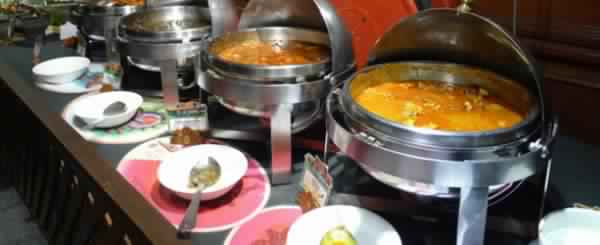THE PURPOSE OF EATING PART 1

When we invite guests, we go overboard to impress them. Disregarding the sunnah of treating our guests well what we have, without burdening ourselves, we can spend days agonizing over the perfect menu and the perfect table setting. We become excessive in displaying our generosity and mastery in the kitchen. In some cultures, it is even frowned upon to serve only adequate portions, for generosity is evidenced by the amount leftovers on the table. We feed and serve to get praised, but will Allah praise us for our wastage of time and resources?
When we eat out, we indulge ourselves by ordering more than what we can consume. Young and old, we push our way at the buffet table. We stack our plates with supersized portions, leaving much of the food to waste. Restaurant owners are delighted by our greed. For some others, fine dining has become a mania, and the consumption of sumptuous and overpriced dishes, complete with 24 carat edible gold leaves, in trendy restaurants has become a status symbol and subject of discussion – another item to add to our social media entries.
The obsession of food can even harm domestic bliss – arguments can erupt and feelings can get hurt if the food is not up to the taste of a spouse. For many cultures, a potential wife’s ability to cook is relevant when picking a bride. We have lost perspective on the purpose of food to the extent that we are willing to put our marriages on the line because of a dish.
Forgetting Halal and Haram
Once we are enslaved by our appetites, we fall into the danger of transgressing the bounds of halal and haram. In the zeal for satisfying our palates, we compromise and eat ingredients which are prohibited. We are quick to give in to our temptations when we see an exotic or delicious dish, regardless of the ingredients and the manner in which it has been prepared. Instead of pleasing Allah by sacrificing our appetites and exercising patience and discipline, we prefer what looks delicious or smells good, even if there are halal alternatives. For a few minutes of enjoyment while the food passes our tastebuds, we compromise our bodies by letting it absorb substances which are haram. In doing so, we put our appetites above the obedience to Allah.
We then convince ourselves that this is not a big deal, they arejust minor infractions and are harmless. However, this is not the case, as the implications are far and wide.
If someone purposely eats forbidden food, it indicates a lack of fear and respect for Allah. The absence of restraint is symptomatic of the lack of obedience. If someone does not value the commands of Allah, how can he be expected to treat anyone, including himself, with respect? If a man betrays his own self and transports his body to hellfire with the consumption of the forbidden, how can he be trusted to lead his family to jannah? If one cannot even control his appetite, how can he control other more powerful and dangerous desires?
If one has eaten forbidden food, including food purchased with a haram income, his deeds will not be accepted for 40 days. If we consistently feed ourselves with a haram diet, allowing such food to become part of our flesh and bones, how do you think it will affect our behaviour? How do you think our standing with Allah will be?
Putting food in its right priority
Our cultures have influenced our manner of eating, and while diversity is allowed in Islam, it should be within the parameters of Islam.
The abuse of food can hurt us financially, influence our moods adversely, and along the way, cause us to build bad diseases and lose our good manners. We tend to forget that what we eat is all a bounty from Allah.
In Islam, food is not supposed to be elaborate or luxurious. Muslims are not to satiate their appetites, but instead should leave the meal before being totally full. This leaves their minds and bodies energetic and alert in order to worship Allah, instead of being drowsy and lethargic.
The Companions of the Prophet SAW were easily recognizable by their lean builds – none of them were overweight, for they were restrained in the preparation and consumption of their meals.
Where is the ummah going if we while away precious time over food – cooking, eating, buying? If we spend all our time with food, indulging in our various eating related habits and disorders, when will we have to develop our deed and to spread Islam?
Continued here: http://www.muslimfootsteps.com/?q=purpose_of_eating_2


![Photo of THE QUR’ANIC MAP [PART 1]](/wp-content/uploads/2020/09/MFS-quran_map-part1-390x220.jpg)
![Photo of THE QUR’ANIC MAP [PART 2]](/wp-content/uploads/2020/09/quranicmap_part2-390x220.jpg)
![Photo of THE QUR’ANIC MAP [PART 3]](/wp-content/uploads/2020/09/quranicmap_part3-390x220.jpg)
Masha Allah
Good website brother, May Allah reward you!